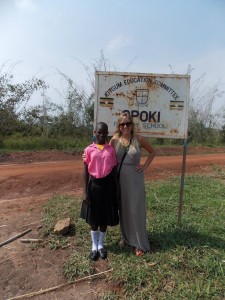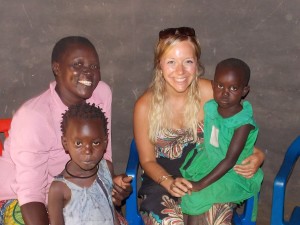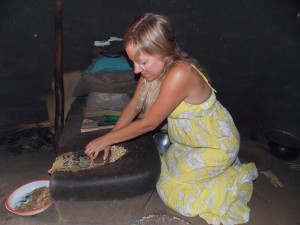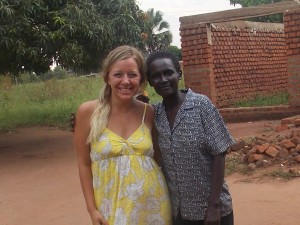Yesterday, I wrapped everything up in Uganda as neatly as possible, but I still fear (or shall I say know?) that the work isn’t “done”; over the last week, I ran full speed, writing documents that needed to be created, arranging conversations that needed to be had, and meeting people that I still needed to greet so quickly that I really haven’t had time to reflect on what this trip has been all about. Â And maybe, like so many of my experiences, I won’t know for a long time. Â I do know that I am exhausted but brimming with vivid, colorful stories that need to be told while still fresh in my mind. Â As I sit in the Amsterdam airport, where it is more clear that Starbucks connects us as human beings than the raw and cumbersome emotions I felt in Uganda, I see that now is the time to try, my six hour window of opportunity to capture what I can.
I started the week in Madi Kiloch to meet yet another sponsored student. This school, Opoki, was another disappointment: with seven classes, only two teachers showed up for work, the students asked to follow the head prefect (Harry Potter meets Africa :)) in song and exercises during the day in lieu of the teacher’s presence. Â Seriously. Â The picture is starting to become more clear in my mind: why should I pay school fees to send my kid to a school where the teachers aren’t qualified and rarely show up, when he/she could be helping me in the field so that we are “guaranteed” (if the drought holds off, if the sun shines enough, if the bugs don’t take over…) some little money and food. Â Now, shame on me for hating on the teachers: they haven’t been paid in three months; as the U.S. and other donors from abroad have started to pull out support, the government doesn’t know how to support itself. Â The month-long trip, though, has worked me over, tearing away my stories of the romantic life of Ugandans; the pictures, complex and difficult to capture, are clear to me now. Â They’re messy. Â And yet they’re mine.
Upon meeting Nancy Lamara, our female 7th grade sponsorship student, her story helped me to see the immediate  complications that keep so many feeling trapped: while her story is unique, everyone has one with a similar plot.  Tears pooled in her big brown eyes as she told it – her father: abducted during the war, beaten to near death, crawled home just in time to say his final goodbyes, just in time for Nancy to watch him die a brutal and needless death.  Her mother: now broke, decided that leaving was her only option.  Her grandmother: the only one left to provide, but knew she had to struggle to do so even though she ages by the day.  And Nancy: grateful to be sponsored, knowing that she wants more, yet unsure what more even looks like.  (Her gift: she’s bold, spunky, secure, unafraid like so many are; she did not hesitate to say, in front of her Headmaster, the teachers’ lack of dedication to her education is her main struggle right now.).  It’s so obvious to me that, while people know what’s good, know what they are lacking, they just simply can’t get out of the cycle of war, poverty, fear, survival.  I left her with a big hug, a promise of our return, of love and greetings from the Pewaukee students, of hope for something better (at least in the short term: we are getting her out of that god-forsaken school for next year).
The next day I traveled to Paloga, that same place where it all began in 2011. Â As we drove past the place where I met those needy kids who inspired me to invest my life in the universal “them”, I heard a voice reminding me that somewhere, someone has orchestrated this. Â To be here two years later, with the beginning of real education initiatives taking place in a very concrete way, I was reminded that this isn’t the end, just like that day wasn’t. Â I took lunch with the same people, the same little Sophia sitting in my lap, the same women cooking for me, the same men sitting around the hut, the same glue binding us together. Â As the people asked me for more funds, for bigger projects, I “fearlessly” spoke my truth (admittedly, it’s easier to be more bold when you are speaking through a translator :)) — that we can’t think bigger until we get this project right; that we can’t live ahead of our current reality until we learn the lessons that God is demanding of us right now. Â On the way out, there was a new born puppy only one week old finding his feet on the compound. Â I picked him up, embracing him in adoration and the people roared in laughter: while people keep dogs here, they, in no way, view them as we do: they are the garbage disposals, the watchmen, the companions of the goats — but the second they kill and eat a free range chicken on the compound, they’re goners. Â But, I can’t release my cultural adoration for puppies, so I scooped him and I named him, I kissed him on the head, only affirming the alien-like nature of the muzungu. Â On the car ride back, we found a man lying on the road. Â We backed up, pulling to the side, as I feared to look and see if his chest was moving or not. Â The driver confirmed that it was, so we got out of the car to help. Â He was just there, seriously not well, one leg buckled under his fallen body. Â Soon a group of travelers on bicycles, motorbikes, and foot-ers (the women with huge bundles atop their heads) gathered round. Â We shook, we shouted, we slapped and finally, he came out of his stupor. “Why are you bothering me,” he spit, vapors of vodka escaping his mouth. Â Seriously?!? It was around 3:00 p.m. Â Everyone laughed from their bellies as they went back on their way. Â My good friend, Kenneth (the deacon who saved my life in more ways than I can include in this here blog post), noticed how I lacked to see the hilarity of the situation. Once back in the car, he explained that it’s normal: the lost generation of men raised in the camps who only know escape. Â “It’s just a part of life,” he said, a cliche that I’ve come to know well over the last four weeks, something people say about issues like abductions and land mines and poisonings and clan wars and empty arrests: issues that are just so clearly NOT a part of life in the USA.
I was told that, on Wednesday, I would be learning how to cook a meal with Joyce, the wife of my educational partner, Otim John Bosco. Â I had met her the week prior when she took me to her classroom where I witnessed her clear excellence as a teacher. Â In a class of 150(!) students, she was able to grasp the love and attention of each once, explaining why the school she works for (our sponsorship school of choice for next year) is the best in the district. Â The plan was that we would cook dinner, so I was surprised to see her at 10:00 in the morning with her three kids and two orphans in tow. Â The whole family (except Dad) had taken the day off for this event. Â I quickly readied myself: for the first time I walked through the bush to get to her place, winding through nonsensical dirt pathways that were clearly mapped in her mind. Â We arrived to the compound where she explained the purpose of the three huts: two easily converted from living room to bedroom to storage room to dining room, the third, the kitchen. Â She laid out the mat and I took a seat: finally I was a real woman, not sitting on a chair with the men, not drinking beer and bottled water while the women hid in a hut working like bees to cater to us. Â She handed me the greens and the kids and I picked the leaves off the stems while she began the fire. Â Her oven/stove combination was quite remarkable: made of cow dung and dirt, it was attached to the side of the hut with a small hole for the smoke leading to the outside. Â She said that she had made it herself and was quite pleased with her work: many of her friends had hired someone to make theirs only to find it broken in a few months. Â Hers had lasted a year so far. Â Back and forth she went, attending the fire, and then demonstrating how she “cleaned” the greens: slapping the dirt off with her hands while it fell through the woven strainer. Â The once shy kids couldn’t contain their giggles: I couldn’t really “slap” but rather “patted” which defeated the whole purpose of removing the dirt. Â Oh well. Â 🙂 Â We then started cracking open the peanuts, the kids dutifully following their mother’s instructions, cutting veggies (with a knife), teaching each other our various methods, comparing the Ugandan cost to the American. Â Once shelled, I learned how to winnow the peanuts, first checking the direction of the wind, before tossing and blowing away their skins. Â At first, I was horrible and probably lost about half of the nuts to gravity, but I gradually got better. Â Back into the kitchen we went where I learned to toast and grind the nuts into a delicious natural butter that we would mix with the veggies. Â We cut the goat, toasted the rice, boiled the greens. Â The smoke ensconced us unbearably, but I was the happiest I’d been all trip, working on something tangible, able to see some form of a concrete result for the first time in awhile. Â All the while, Joyce and I shared stories of cooking, explaining our methods, exchanging words for “knife” and “pot” in Acholi and English. Â She taught me songs and we sang along with the kids as we completed the work. Â I lost myself in the process and quickly hours passed by.
Once the meal was complete, we retreated to the living room/dining room hut where I tasted the food with a whole new mouth: one filled deep with appreciation for every meal I’d had in this place. Â Peace, the youngest daughter and my favorite of them all, snuggled into my lap and fell asleep as we took tea and exchanged more stories: childbirth (I’ve been sharing the news of my aunt-hood everywhere :)), wife-hood, mother-hood — struggle, joy and pain. Â While this woman was connected to the universal stories of pain (three of her cousins killed her mother out of jealousy for her successful family; he brother died of TB on his bike-ride to visit her — all in one year), she was adamant in believing in a plan, a purpose, a reason beyond them. Â She considered herself blessed, lucky even. Â The rain came, showering the fields as the plants sighed in relief, while the thatched roof, made of elephant grass, protected us. Â As the rain ceased, the moon came out and we had to “foot” our way back to the church. Â We walked along dark pathways through muddy puddles, sad that our full day together was coming to an end. Â Joyce, afraid that I would slip, that my GAP sandals would get dirty; me, happy to be living the life that is so beautifully hers, walking the footpath, the dirt connecting me to something about these people I couldn’t possibly know before as I drove in cars and waited for food. Â As she dropped me off, I joyfully skipped formalities and scooped her little body into my arms. Â My friend. Â My equal.
The last few days were full of challenging meetings and confrontations, and I felt so grateful for Joyce because before heading into those last few conversations, she was able to humanize the situation for me, getting me out of my anger, my intellect, and bringing me back to why we are doing all of this: for the people. The nature of our struggles are not worthy of mentioning, but we concluded with a very well-thought out plan in place to avoid the mistakes of our past.  I felt exhausted, but good about it.  Friday morning, I picked up some sunflower oil (the finest I’ve seen!), and packed my dirt-crusted things into the vehicle: my work, finished; my trip, complete.  As pissed off as I have been, as sad, angry, and helpless, I wept for the ending of this chapter as we drove away.  Once on the plane, the experiences finally started to bubble up from my cells, into a place where I could just slightly begin to understand and articulate them.  Above the clouds, above the chaos below, I watched as the sun chased us to Amsterdam where I currently sit and type, Grande Americano in hand.  Naked, vulnerable, free  of layers that once constricted me, I somehow feel changed, the experiences themselves working me over, stripping me down, molding me anew.  While I don’t have the words for what has exactly taken place, I do know that as I peek over my shoulder at the story that is My Past, it is clear that every single experience has led me to this moment.  The Erin of five years ago, even three months ago, couldn’t have done what I just did, whatever that was.
I once heard that the Universe will keep handing you the same lesson in different but similar forms until your soul finally masters it, which I used to think was a cruel form of punishment. Â But, now, I think I get it. Â Just like the teacher who keeps demanding that His student, who carelessly puts the comma wherever she damn well pleases, learn the rules. Â He calls the student to attention, teaching her the rules again and again, patiently doling out more practice until one day she gets it. Â The comma becomes her nature. She doesn’t even have to be cerebral about it as she writes. Â The teacher isn’t punishing her; rather, He doesn’t want His instruction, His time, His dedication to His student to be in vain. Â So He keeps at it, watching her closely, attending to her unique, individual needs. Â And so it has been for me: the challenges of this month, a complicated mess of all the skills I have never really learned to master, were served to me on one big platter, begging my attention. Â It seems that the Teacher has more planned for me, and so now is the time to get these learning targets out of the way. Â And maybe all of those experiences amidst the sometimes-mundane-hamster-wheel-of-my-life back at home were important too, the practice exercises hidden underneath them all. Â Maybe they were leading me here, to the final cumulative exam. Â In a few hours, I will get back on the plane that will drop me back into “normalcy” and while I fear that I will lose my footing from the top (as I always inevitably do) unable to see the vantage point from above, I know that whatever lies ahead, even if it means another decent to the valley, will somehow, some way make sense — eventually. Â And so it is.




Erin, an amazing experience and story well told, I have this feeling that you are inside of life on another planet, and I am doing my best to understand it, but knowing that it is so different that the only way to truly know it is to be there. You are really lucky to have had this difficult experience, it will change how you experience life on your “home planet “.
Oh Erin, thank you for this beautiful blog! I can read your beautifully written words and “see” exactly where you are and what you are describing! I feel a bit like I’ve had a small peek into a trip to Uganda. How true that all your experiences, good and bad, can be processed when you are “above the clouds”!! It almost seems to me that you have been through the Labor Pains of this rebirth you have experienced! The “birth” of this project continues to be so worth the pain honey. The re-birth of your own Self, is so worth the labor pains (just as you had said in your very first blog coming out of your hiking trip…..the the pain has made the end so much more worthwhile and beautiful!) I can’t describe to you in words how very proud of you I am, how much I learn from you for my own spirit, and how much both dad and I support you wholeheartedly. Yes, we have missed you so immensely, yes, we’ve worried a bit too, but all along we knew God was watching over you (and your dear Shawn, of course, too! 🙂 ) There is no doubt that we cannot wait to be with you, hug you and give you some huge “welcome home” and “we love you so much” kisses and hugs. Thank you for sharing all these experiences and re-awakenings with us honey! We love you so much! Mom (Dad too!)